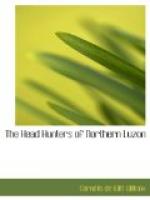Bad as the outlook is, no remedy suggests itself. For, returning to the theme that agriculture is recognized as vital, much energy is spent in discussion, discourses, lectures, in writing articles, in discovering reasons why agriculture does not flourish, but nothing else and nothing more. [56]
The picture may be overdrawn; but it is a Filipino picture, drawn by a Filipino hand. Let us now permit, the native press to speak again on the subject engaging our attention. Thus Vanguardia [57] a bitter anti-American sheet, arraigns its wealthy fellow-countrymen for lack of initiative and fondness of routine. It accuses them of a willingness to invest in city property, to deposit money in banks, “to make loans at usurious rates, in which they take advantage of the urgent and pressing necessities of their countrymen,” but of unwillingness “to engage in agriculture, marine or industrial enterprise”; and says they are “generally lacking in the spirit of progression.” According to another native newspaper, the vice of gambling has infected all classes of society, men and women alike, rich and poor, young and old. Mere it is almost impossible to overdraw the picture, so widespread is the vice. Let us now couple these statements, drawn from native sources, with the fact that the Christianized tribes, all told, number some 7,000,000; that of these but one-tenth speak Spanish; and that of this tenth only a very few are educated in any accepted sense of the word. Repeating here a form of summation already employed in this discussion, let us bear in mind that, if we decide to make a grant of independence, we shall be deciding to grant it to a population, composed, first, of a very few educated persons; next, of a small fraction able, through the possession of Spanish, to communicate, with one another; and, lastly, of a remainder—the vast, the immense majority—not only unable so to communicate, but characterized by qualities that, however commendable in themselves, do not constitute a foundation on which popular self-government may safely rest. Further, we mean to grant it to a population which contains no middle class, to one in which the poor are peculiarly at the mercy of the rich, and in which nearly all the elements that make for economic independence are conspicuously lacking.




